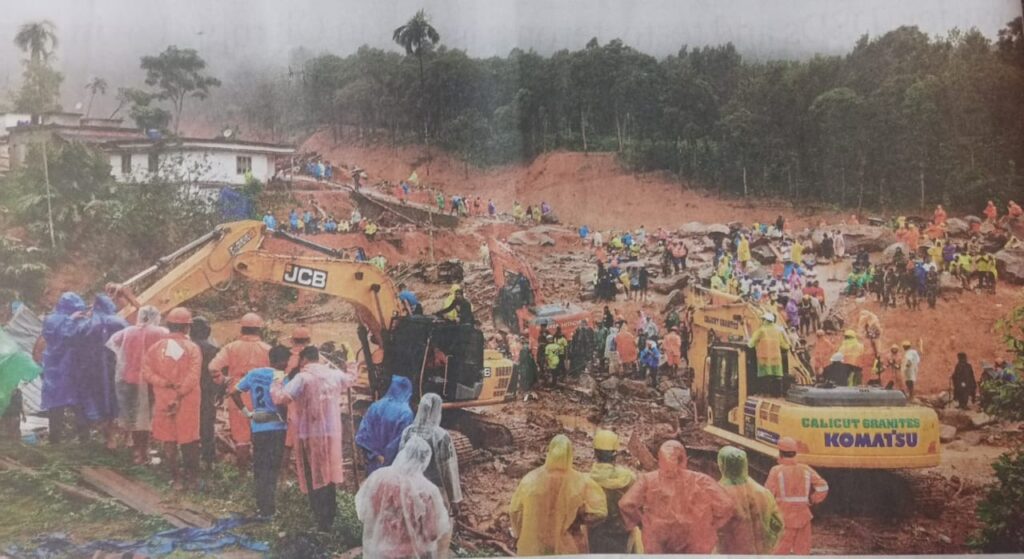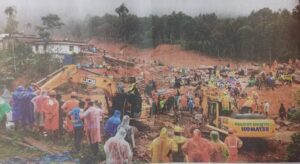In the hills of Wayanad lies Puthumala, a village that was wiped out in a landslide in 2019. Five years on, survivors of the latest tragedy fear a similar future
Five years ago, in August 2019, a devastating landslide claimed 17 lives in Puthumala, a village in Kerala’s Wayanad district. The disaster wiped out houses, places of worship, shops, and other establishments, leaving Puthumala a ghost village. A once forested area, 1.5 kilometers uphill from Puthumala, is now covered in weeds.
On July 30 this year, tragedy struck again nearby in Chooralmala and the villages of Mundakkai and Attamala. The disaster’s scale was much larger, with the death toll reaching 210 and 218 people still missing as of August 2. With little hope of finding survivors, these villages in the Meppadi panchayat have become a valley of death.
Survivors are currently housed in relief camps in Meppadi panchayat, but the government faces the challenge of rehabilitating those left homeless by the landslides.
Chief Minister Pinarayi Vijayan, appealing for contributions to the Chief Minister’s Distress Relief Fund (CMDRF), emphasized the need for more resources to rebuild the region. “Many people have already pledged assistance, but it is not enough. Generous contributions are required,” he said.
Kerala Public Works Department Minister Mohammed Riyas, a member of the Cabinet sub-committee, stated, “Rehabilitation plans will be decided only after detailed discussions… Many survivors need counseling to regain their mental strength. Resuming the education of their children is also a priority.”
The deserted village of Puthumala, destroyed in the 2019 landslide, highlights the rehabilitation challenge for Chooralmala and Mundakkai. Most families left Puthumala after the 2019 tragedy and have not returned, with no new buildings allowed in the affected area. Aboobacker, the sole tea shop owner in Puthumala, recalls that around 90 families lived there before the 2019 disaster. Now, less than a handful remain.

A dozen families now live in Puthumala, where many had once owned good houses but abandoned them after the landslide. “People do not even return to look after their agricultural land,” says Aboobacker.
Survivors of the recent landslide are lodged in temporary camps and resigned to starting over. With lingering nightmares of the landslide, many are reluctant to return to their ravaged villages, where hundreds of houses have been damaged, either completely or partially.
A poignant song released for the annual day celebrations at Vellarimala Government Vocational Higher Secondary School (GVHSS) in 2023 describes a school standing tall at the foot of Vellarimala. This school was destroyed in the July 30 landslide, with over 20 students feared dead.
Vikas, a former student, shares an Instagram photograph of the ravaged school, his eyes damp. His father Ponnayyan, a lottery seller, has lost several neighbors and friends. “We have to move to a new place and start afresh. We have no savings either. All these years at Chooralmala, we lived as a community, helping each other. Now we have no option but to move away,” he says.
Mahadevi, in her late 60s, came to Wayanad from Karnataka decades ago to work on tea estates. She lost all three of her sons and their families in the landslide. “There is no one left to do my last rites. I don’t know what’s the point of my life now,” she says.
Like Mahadevi, Manickyam moved to Wayanad from Tamil Nadu in 1984, did various jobs, and bought land in Chooralmala in 1999 to build his house. Now, he is uncertain about the future, unable to sell his property. “Even if I want to go back to Salem, I can’t sell my property here because no one will buy it,” he says.
The song from GVHSS has resurfaced on social media, bringing tears to the survivors. Janeesh, whose daughter Tanmaya studied there, fears she may never return to the school she loved. “All I wanted was for her to get a good education, but now we are stuck here at the relief camp,” he says, adding that Tanmaya is unaware of the losses among her classmates.
Following the August 2019 landslide, the government rehabilitated 54 families from Puthumala on seven acres at Kottapadi village in Wayanad. The Mathrubhumi Charitable Trust bought this land from a tea plantation to help the displaced families. A people’s committee, led by the Meppadi panchayat, secured sponsorships from several charitable organizations to support the rehabilitation efforts.
Trusts constructed houses for 54 families, completing the project in 2020. Another group of survivors received Rs 10 lakh each from the Kerala government to purchase new land and houses.
“The biggest difference between life at Puthumala and Poothakolly is the cost of living. Here, we are closer to the town. I still go to Puthumala to farm cardamom and coffee on my two-acre plot. Our official documents still bear the address of our house in Puthumala. We even cast votes in Ward 9 there,” says Alavi, who moved to Poothakolly with his wife.
“We came here (Poothakolly rehabilitation project) with no resources. The government and sponsors did all this for us. We are grateful for what we have here and to have survived the 2019 landslide. We were saved because the landslide happened during the day; otherwise, our fate would have been the same as those in Mundakkai and Chooralmala,” says Beeran, another resident.
Despite multiple smaller landslides in the region, tourism has grown in these ecologically fragile Western Ghat villages. According to industry sources, Meppadi panchayat has about 600 registered resorts/home stays. “After plantations started running into losses, people turned to tourism to earn their livelihoods. Despite repeated natural calamities, tourism was never hit. Cancellations of bookings in the region were only temporary,” a source said.
While tourists may return, the residents face a different reality. Anand, from Chooralmala, says, “The region has become uninhabitable. At Puthumala, the panchayat did not allow any new building permits in places where houses were destroyed (in August 2019). The same situation is likely to happen here since the landslide has changed the profile of the village. Perhaps those who have agricultural land in the hills may return to look after their fields.”
Kavungal Hamza, 60, whose house in Chooralmala was washed away, says his family doesn’t want to return to the village. “My house was destroyed—not a single brick is left on the five cents of land we owned. My two school-going children have lost their books. We lost all our household items and belongings. How do I rebuild my life at this age?” he says.



